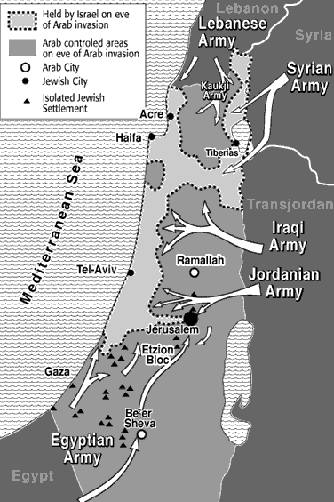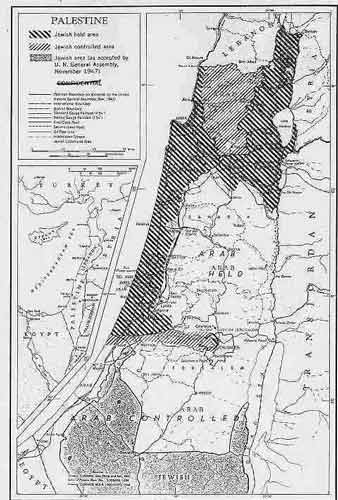Myths & Facts - The War of 1948
“The Jews started the first war with the Arabs.”
“The Bernadotte Plan was a viable alternative to partition.”
“The United States was the only nation that criticized the Arab attack on Israel.”
“The West's support of Israel allowed the Jews to conquer Palestine.”
“The Arab economic boycott of Israel was imposed after the 1948 war.”
“The Jews started the first war with the Arabs.”
FACT
The chairman of the Arab Higher Committee said the Arabs would "fight for every inch of their country."1 Two days later, the holy men of Al-Azhar University in Cairo called on the Muslim world to proclaim a jihad (holy war) against the Jews.2 Jamal Husseini, the Arab Higher Committee's spokesman, had told the UN prior to the partition vote the Arabs would drench "the soil of our beloved country with the last drop of our blood . . . ."3
Husseini's prediction began to come true almost immediately after the UN announced partition resolution on November 29, 1947. The Arabs declared a protest strike and instigated riots that claimed the lives of 62 Jews and 32 Arabs. Violence continued to escalate through the end of the year.4
The first large-scale assaults began on January 9, 1948, when approximately 1,000 Arabs attacked Jewish communities in northern Palestine. By February, the British said so many Arabs had infiltrated they lacked the forces to run them back.5 In fact, the British turned over bases and arms to Arab irregulars and the Arab Legion.
In the first phase of the war, lasting from November 29, 1947 until April 1, 1948, the Palestinian Arabs took the offensive, with help from volunteers from neighboring countries. The Jews suffered severe casualties and passage along most of their major roadways was disrupted.
On April 26, 1948, Transjordan's King Abdullah said:
[A]ll our efforts to find a peaceful solution to the Palestine problem have failed. The only way left for us is war. I will have the pleasure and honor to save Palestine.6
On May 4, 1948, the Arab Legion attacked Kfar Etzion. The defenders drove them back, but the Legion returned a week later. After two days, the ill-equipped and outnumbered settlers were overwhelmed. Many defenders were massacred after they had surrendered.7 This was prior to the invasion by the regular Arab armies that followed Israel's declaration of independence.
The UN blamed the Arabs for the violence. The UN Palestine Commission was never permitted by the Arabs or British to go to Palestine to implement the resolution. On February 16, 1948, the Commission reported to the Security Council:
Powerful Arab interests, both inside and outside Palestine, are defying the resolution of the General Assembly and are engaged in a deliberate effort to alter by force the settlement envisaged therein.8
The Arabs were blunt in taking responsibility for starting the war. Jamal Husseini told the Security Council on April 16, 1948:
The representative of the Jewish Agency told us yesterday that they were not the attackers, that the Arabs had begun the fighting. We did not deny this. We told the whole world that we were going to fight.9
The British commander of Jordan's Arab Legion, John Bagot Glubb admitted:
Early in January, the first detachments of the Arab Liberation Army began to infiltrate into Palestine from Syria. Some came through Jordan and even through Amman . . . They were in reality to strike the first blow in the ruin of the Arabs of Palestine.10
Despite the disadvantages in numbers, organization and weapons, the Jews began to take the initiative in the weeks from April 1 until the declaration of independence on May 14. The Haganah captured several major towns including Tiberias and Haifa, and temporarily opened the road to Jerusalem.

The partition resolution was never suspended or rescinded. Thus, Israel, the Jewish State in Palestine, was born on May 14, as the British finally left the country. Five Arab armies (Egypt, Syria, Transjordan, Lebanon and Iraq) immediately invaded Israel. Their intentions were declared by Azzam Pasha, Secretary-General of the Arab League: "It will be a war of annihilation. It will be a momentous massacre in history that will be talked about like the massacres of the Mongols or the Crusades."11
“The Bernadotte Plan was a viable alternative to partition.”
FACT
During the summer of 1948, Count Folke Bernadotte was sent by the UN to Palestine to mediate a truce and try to negotiate a settlement. Bernadotte's plan called for the Jewish State to relinquish the Negev and Jerusalem to Transjordan and to receive the western Galilee. This was similar to the boundaries that had been proposed prior to the partition vote, and had been rejected by all sides. Now, the proposal was being offered after the Arabs had gone to war to prevent partition and a Jewish state had been declared. The Jews and Arabs both rejected the plan.
Ironically, Bernadotte found little enthusiasm among the Arabs for independence. He wrote in his diary:
The Palestinian Arabs had at present no will of their own. Neither have they ever developed any specifically Palestinian nationalism. The demand for a separate Arab state in Palestine is consequently relatively weak. It would seem as though in existing circumstances most of the Palestinian Arabs would be quite content to be incorporated in Transjordan.12
The failure of the Bernadotte scheme came as the Jews began to have greater success in repelling the invading Arab forces and expanding control over territory outside the partition boundaries.
“The United States was the only nation that criticized the Arab attack on Israel.”
FACT
The United States, the Soviet Union and most other states recognized Israel soon after it declared independence on May 14, 1948, and immediately indicted the Arabs for their aggression. The United States urged a resolution charging the Arabs with breach of the peace.
Soviet delegate Andrei Gromyko told the Security Council, May 29, 1948:
This is not the first time that the Arab states, which organized the invasion of Palestine, have ignored a decision of the Security Council or of the General Assembly. The USSR delegation deems it essential that the council should state its opinion more clearly and more firmly with regard to this attitude of the Arab states toward decisions of the Security Council.13
On July 15, the Security Council threatened to cite the Arab governments for aggression under the UN Charter. By this time, the Israel Defense Forces (IDF) had succeeded in stopping the Arab offensive and the initial phase of the fighting ended.
Military Situation On Effective
Date of Cease-Fire
(June 11, 1948)
 |



